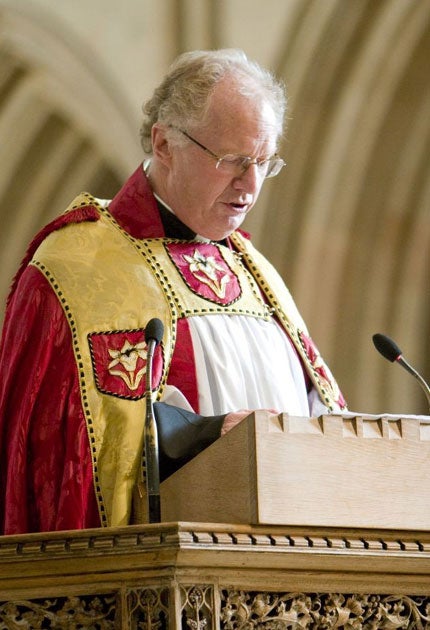The Very Reverend Colin Slee: Controversial liberal dean of Southwark Cathedral

Colin Slee was one of the few cathedral deans known to many, including those usually indifferent to the church.As Provost and then Dean of Southwark from 1994 he was often in opposition to the less liberal elements of the Church of England.
Colin Bruce Slee was a policeman's son who attended Ealing Grammar School. This was the springboard for a long association with King's College London, where he arrived as a student. He returned, thanks to its dean Stanley Evans, as tutor and chaplain. In 2001 he was made a fellow.
Slee trained for the priesthood at St Augustine's College, Canterbury, and in 1970 was ordained deacon to a curacy at St Francis, Heartsease, in Norwich. In 1973, now married and a priest, he moved to Cambridge to be chaplain of Girton College and curate at Great St Mary's. In 1982 he returned to King's for eight years before becoming Sub Dean of St Albans Cathedral. Here he demonstrated his radical and controversial side by displaying an election poster for the short-lived Social Democratic Party.
His appointment in 1994 to Southwark as Provost (renamed Dean in 2000) appeared appropriate as in the 1960s he had been influenced by John Robinson's controversial book Honest to God, associated with what became known as "South Bank religion".
Although Slee was a liberal catholic he was firmly Anglican. He insisted that the chapter wear clerical dress and attend daily offices. He believed that the lectionary must be adhered to and that the mother church of the diocese should be a centre of liturgical excellence.
He arrived just before the area emerged from obscurity to become a cultural centre led by the establishment of Tate Modern. Slee saw that the cathedral was not left behind and embarked on a building programme. Unlike most of his fellow deans, whom he represented at General Synod, he believed in cathedrals "having proper parish responsibilities". The parish was enlarged, and with a congregation doubled and more diverse, Slee talked about "managing success"; it was not unusual to arrive for the Eucharist and find Desmond Tutu or another archbishop as celebrant.
Guests stayed at Provost's Lodging alongside the Globe. Here the Slees looked across the Thames to St Paul's. He enjoyed claiming that Southwark was better than St Paul's by not imposing an admission charge. Switching on the new floodlighting, he claimed that it had a lower level of light pollution than the other cathedral's system.
He admired the "evident faith" of the Queen and was encouraged by her interest. She chose to worship at Southwark Cathedral on Millennium night before sailing down to the Dome. In 2006 she readily came for the unveiling of the memorial to a Mohegan chieftain long buried in an unmarked grave at the Cathedral. Two weeks later she recorded part of her Christmas message there.
During Slee's 16 years at Southwark, visitors included Nelson Mandela and all four prime ministers. Last year he allowed the beleaguered Zimbabwe premier Morgan Tsvangirai to use the cathedral for a rally of exiles. Slee, who had visited and studied in South Africa, was unfazed when protests caused the address to be curtailed. During the 400th anniversary of John Harvard's baptism in Southwark he could not resist suggesting that it was the narrow religious view of such emigrants which gave rise to the US's neocon right.
A low point for Slee was when it fell to him to announce that one of his canons, Jeffrey John, was to be denied the Bishopric of Reading to which he had been appointed. He had been opposed by evangelicals fearful of a gay person being a prelate. Slee believed in an inclusive church and said so when it was not fashionable. He was always pleased to welcome disenchanted evangelicals to his confident congregation.
As with Jeffrey John, there was a sense of anticipation when Slee was due to preach. Although there might be a good soundbite, his discourse was always strongly Bible-based. His robust humour could be misunderstood. On leaving Winchester Cathedral, his host said, "Do come again." "I shall," Slee replied. "I am looking forward to attending your bishop's funeral." The astonished canon was unaware the bishop had just presided at a hearing which had gone against Slee's strong views.
He was a trustee of Borough Market, where he took pleasure in buying "Stinking Bishop" cheese. Looking to the future, he struck a deal with Network Rail to protect the cathedral from the Thameslink plans. "Being dean feels like being on the footplate of a runaway express train," he once said. "It is exciting as the church should be."
Following heart surgery last year he was again on his bicycle. He criticised George Carey's call to limit immigration as "utterly extraordinary". At Easter he persuaded many to miss lunch and demonstrate against President Mugabe. In June he triggered what became known as "Mitregate" by welcoming Katharine Jefferts Schori, the first Anglican woman primate. In October he was diagnosed with cancer following a fall. Death came swiftly at home.
Colin Bruce Slee, priest: born London 10 November 1945; married 1971 Edith Tryon (one son, two daughters, one foster son, one foster daughter); OBE 2001; died Southwark 25 November 2010.
Join our commenting forum
Join thought-provoking conversations, follow other Independent readers and see their replies
0Comments